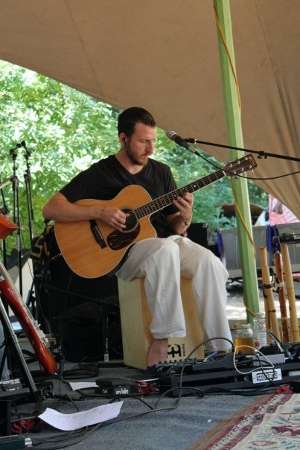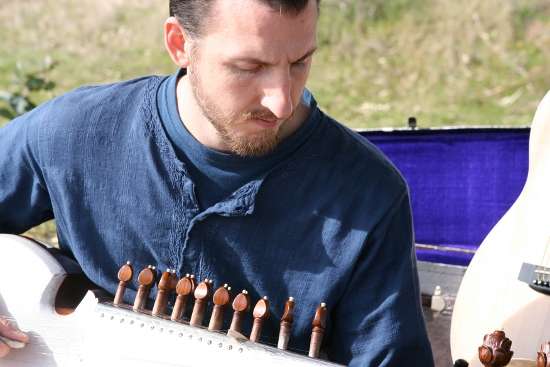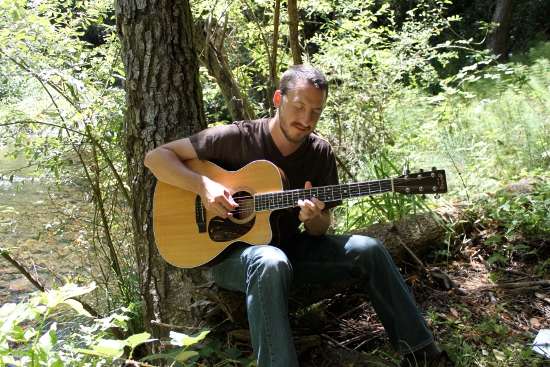Interview with Todd Boston: a multi-instrumentalist and soulful musician

As destiny would have it, Todd learnt music from the great Sarod maestro Ustad Ali Akbar Khan, which of course increased the repertoire of his music. In the winter of 2006, he relocated to the San Francisco Bay Area and started the band Urban Nature and studied the sarode with the Maestro.
It is clear that Todd music has been enriched by his associations with many artists, musical types and his study of various types of subjects.
 We had an email interview with Todd.
We had an email interview with Todd.
Q1. Tell us something about your early days in the childhood.
When I was a young boy, I lived in the country-side of Pennsylvania. Music and nature were intertwined as powerful influences in my life. In our old country farm house we had an upright piano in the foyer and my mother encouraged me at age seven to take lessons. From there I explored the saxophone and drums in the school band but eventually was kicked out in 7th grade for throwing clay balls into the instruments of the brass section. A long story, but the conductor was not pleased.
My parents split up; we moved closer to the city and I got my first guitar at age 11 which became the foundation for my life with music.
Q2. How you liked music and thought of picking it up as a career?
Music became a huge influence on my life in those teenage years. It literally became a friend, therapist and healer for my young confused heart. When everything else seemed chaotic and out of order, there was a simple order and harmony in music that gave my soul peace.
I noticed very early on when I was troubled and sat down to play music for an hour or more, whenever I stopped my troubles seemed much smaller.
You can say music chose me. I always knew music would be a big part of my life and when it was time to go to college I thought I would go and study so that I could get “a real job.” What I learned in college was that my “real” job was music.
Q3. Talking about guitar, how it attracted you? Was there anything particular about its music that made you choose it as your instrument?
I feel that the guitar has the ability to be shaped by the personality of the musician and this was a key attraction for me. I was looking for ways to self-express and the guitar gave me such a great canvas and selection of colors to paint with. The instrument really has the ability to sound completely different in the hands of different individuals; this sense of uniqueness has always appealed to me in life.
Q4. Talking about your formal training, how was the experience?
I took guitar lessons for about four months at the very beginning. I then focused on being self-taught, which is always a figure of speech. Really, that means my teachers were the recordings of Eric Clapton, Jimi Page, Jimi Hendrix, Carlos Santana, BB King, Joe Satriani, George Harrison, Michael Hedges and many others.
It was in my mid-twenties that I began to really want a teacher and found a great one named Ernie “Teach” Chavaria in Phoenix, AZ. Teach was an intense teacher who had spent his 30+ years as a performer playing in bands with James Brown, Tito Puente and Natalie Cole as well as leading his own groups. He really came from a different time of musicianship and work-ethic and drilled into me professionalism and mastering my “axe”. He continues to be a huge inspiration and support.
Around that time I also met a great teacher named Silvia Nakkach. She began to teach me about Ragas and Indian Music and said to me, “you need to go to San Francisco and study with my teacher (Ali Akbar Khan).” So I did.
 Q5. Later on, you had the chance of associating with Late Ustad Ali Akbar Khan. How was the experience of learning from such a refined doyen of classical music? Was it difficult to learn because he played a different instrument?
Q5. Later on, you had the chance of associating with Late Ustad Ali Akbar Khan. How was the experience of learning from such a refined doyen of classical music? Was it difficult to learn because he played a different instrument?
The experience of working with the late great maestro, Ali Akbar Khan or Khansahib as he is known by his students was life changing for me. One of the first things he said to me is “Nada Brahma”, which is a Sanskrit word that basically means Sound is God. This belief that the whole of creation comes from sound and vibration is one I deeply resonate with. Right from the beginning, I knew this would be a special opportunity to learn from a true master. Khansahib always taught us to play in tune and in time. This is a great lesson for all musicians.
I studied on Sarod because I felt a deep connection to the instrument and wanted to really learn the nuances of the music. With that being said, the early classes in particular were so challenging for me. The instrument was challenging to play because you use your nail to get the note and there are no frets so you have to be very exact with your tuning. Not to mention the amount of time it took to tune 25 strings.
Khansahib would dictate the raga and the advanced students would take it and play it, usually quite well. It was a common language they had devoloped over many years. I came in and did all I could to retain as much as possible. Every class got a little easier.
Q6. Do you like the element of experimentation within the range of a particular instrument? As you were exposed to world music, do you think you developed a knack of experimentation?
I love seeing how many sounds I can create on the guitar. Experimentation has always been a big part of my playing and finding if I can make it sound like a drum, a cello, a sitar, nature sounds, whale cries, etc. I love American music but also love the expansiveness and depth of world music. I also believe in experimenting with different instruments. A friend gave me a bamboo flute years ago which I continue to play. Drumming is a big part of my life and singing as well. I have many instruments around the house and feel that exploring the qualities of these instruments always brings me back to the guitar a better musician.
Q7. You have associated yourself with Yoga and spiritual significance of music. How it has been doing and how do you feel you got personal benefit from this persuasion?
There is a revolution in the west where people are seeking more depth and meaning in their lives. People are learning that we have the keys within us to be happy and live full lives. You could say a spiritual revolution is happening in America; music and yoga are at the forefront because they offer us the tools to find peace and truth inwardly. To “be the change you want to see in the world.”
When I was younger, I could feel the spiritual depth in all music but was seeking greater meaning. Some of the early Beatles music like the great George Harrison song Within You Without You (Ravi Shankar on Sitar) appealed to me because of the instrumentation and the soulful spiritual message. This sense of connection, purpose and meaning has helped guide my life in positive ways.
Q8. What do you feel is the true satisfaction point for an artist—winning awards or winning hearts? What personal satisfaction do you seek in your music?
Winning awards for music is a great way to know your music is creating a buzz within the music business. And if you are going to have a career playing music you have to be successful in the music business. But there is no comparison to the satisfaction of winning hearts and creating music that touches people, builds community and benefits their lives. Music is entertainment but more importantly it can help us to heal and grow as people.
The greatest fulfillment I get from creating music is when I know it is really helping people and is of service…that is the greatest award.
Q9. You have been teaching music. While talking to youngsters and aspirants in your classes, what essential elements you stress upon to learn guitar?
Posture, Breath Awareness, and Practice!
Q10. Tell us about your gears that you use for recording as well as live-performances.
I play a Martin auditorium style guitar with a microphone pickup system in the body to get the acoustic richness of the instrument.
Recording is mostly about great performances, great sounding instruments, great microphones and pre-amps. If you start there the rest is easy.
I do quite a lot with looping these days. The concept of the Alive album was to bring looping compositions into the studio. I utilized the Boss RC50 with Cubase to track and record live all the songs. In other words, all the guitar and flute tracks were recorded at once, looped live with no additional overdubs. The percussion and cello we did as overdubs in the studio. My goal was to bring an energized and alive sound to the songs.
Q11. Share your thoughts about your new CD—Alive?
I am very happy with the Alive album; it is getting some nice radio airplay and attention. My intention was to create an album that touched peoples hearts and had the feel of a live performance. Often people when they come and see you perform ask, does your CD sound like this. So now, I can say yes.
Q12. Tell us what else you like to do while not playing music.
I enjoy a quiet life in the country, taking hikes, bike-rides and enjoying friends and family. I live in special part of the world where the redwoods and the ocean are nearby; so nature is a big part of my life. We have a creek in the backyard complete with raccoon, squirrels, birds and deer that are constantly running around. I also have a passion for teaching and sharing music with others.
Living near San Francisco offers an abundance of amazing events, people and places to see.
Q13. If not music, what else you could have done in your life?
It’s a good question…maybe a forest ranger, or an activist, maybe an english teacher.
Q14. What message you would like to give to the readers and young aspirants of music?
Include music in your life as much as possible. We are all musicians no matter how much you aspire to be great at a particular instrument. We are all born into the world musical, music is our birthright, it is a bridge to help us to connect to the unseen worlds all around us. It teaches us to be patient, to focus, to have body and breath awareness, to be present in this moment. Music can help us to feel better, plus it’s fun!
If you want to be great at music, play a lot, practice with purpose and focus.



 Album Review—Inner Sanctum
Album Review—Inner Sanctum  Album review—Back To My Roots
Album review—Back To My Roots  Album Review—Days of Gypsy Nights
Album Review—Days of Gypsy Nights  Album Review—Open by Stephen Wallack
Album Review—Open by Stephen Wallack